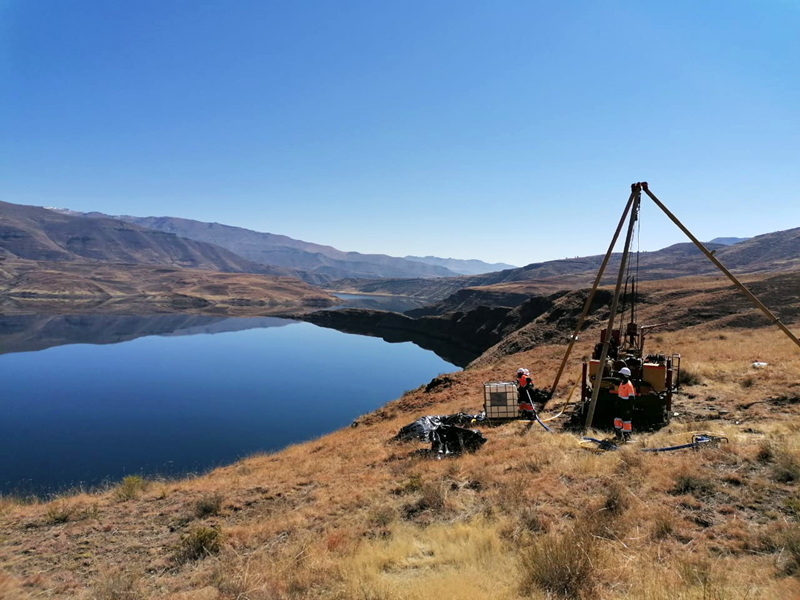Polihali Transfer Tunnel

POLIHALI TRANSFER TUNNEL
In August 2021, the Geomechanics team broke ground in Lesotho for the Polihali Transfer Tunnel project. The client required Geotechnical Data for the design and construction planning of a transfer tunnel. The mandate was to conduct drilling at 4 various drill locations for core extraction, Lugeon testing, Hydrofracture testing and downhole surveying.
At one of the drill locations, the team had to drill a total of 450 meters at a 45-degree incline. At approximately 50-meters, we encountered 100% water loss. This was due to interchanging formations of Basalts and Dolerite. The Dolerite was extremely fractured, causing a blockage hindering the advancement of the drill bit. This resulted in us doing shorter runs, with slightly slower production than expected. The team did anticipate that there could be possible delays conducting the Lugeon Tests at the 45-degree angle. At this angle, the packers would have difficulty advancing down the hole. To overcome this obstacle, the team fitted additional weights to the packer system for it to reach the testing depth. The Geomechanics team was able to complete all the drilling works within the allotted time frames, and successfully conducted 71 Lugeon tests and the downhole survey and Optical/Acoustic Televiewer were done by Wireline Workshops.
Sol-experts, hydrofracturing specialists from Germany, were sub-contracted to do the Hydrofracture testing in one of the boreholes. Coordinating the completion of the borehole with the arrival of the Sol-experts equipment and personnel was key to the contractual program. The entire camp to house and feed the staff was brought in and set up with flat-pack containers, ablutions, and generators and all electric work set up by South African company Eddy’s Electrical, keeping the Geomech crew comfortable throughout the cold season.
Working in Lesotho holds its own unique set of challenges. Local communities need to be kept informed of what is going on and community members need to be employed through the correct channels. The team participated well with the local community, offering several job opportunities for the duration of the contract. Given the high altitude of the project, the weather conditions posed a challenge to the team at these heights. With temperatures ranging from -4 degrees to 30 degrees Celsius, it’s safe to say that you have to be fully prepared for freezing snowfall and high temperatures all in a couple of days’ time.
The team maintained a 100% safety record throughout the project and had no serious accidents or injuries to report. The client was extremely satisfied with the outcome of the project and the quality of the core delivered.
Plot 28 Central Road
Sunrella, Lanseria
Gauteng
South Africa
Tel. +27 (0)861 436 632
Email. info@geogroup.co.za